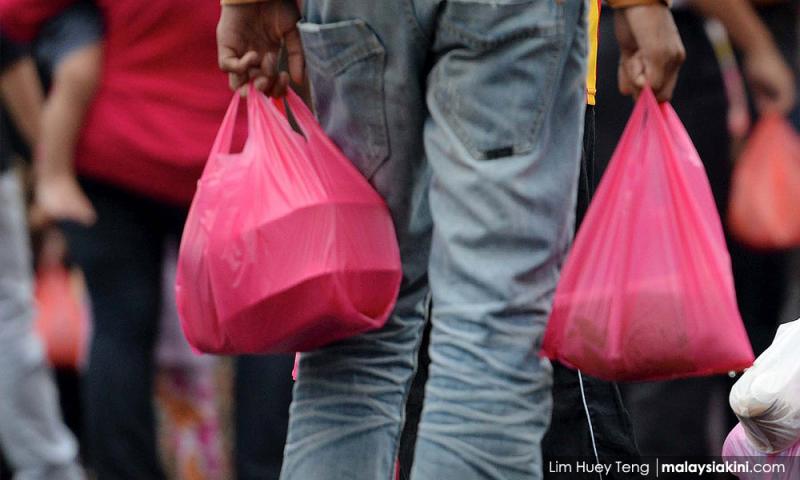LETTER | Ban on plastic bags for retail purposes - execution is key
LETTER | Plastic pollution is suffocating our planet – and it's only getting worse. Production has rocketed in the last two decades, with more plastic being produced between 2003 and 2016 than in the whole of the 20th century.
While plastic is cheap and versatile, with countless uses across many industries, almost half of all plastic is used to create short-lived or single-use products that can spend hundreds of years degrading. Globally, less than 10 percent of plastic products are recycled.
According to a report published by WWF-Malaysia, the estimated total annual post-consumer plastic waste generation in Malaysia in 2016 at over one million tonnes, which is equal to the weight of almost 10,000 blue whales and can fill up approximately 76,000 garbage trucks.
Alarmingly, in 2021, our Klang river is listed as among the world's highest emitters of plastic into the ocean. It holds the tie of being the second-highest riverine emitter of plastic with India's Uthas river and the Philippines' Tullahan river.
As such, this is why the recent announcement by the Natural Resources, Energy and Climate Change Ministry on the government’s plan to eliminate the usage of plastic bags for retail purposes across all business sectors nationwide by 2025, is a welcomed move.
According to minister Nik Nazmi Nik Ahmad, the campaign is carried out in stages, starting with fixed business locations like supermarkets and certain shops. The campaign would then be expanded to other business locations after being implemented in all physical outlets by 2025, including roadside stalls.
WWF-Malaysia is fully supportive of this plan. However, execution is key to ensuring the impact and effectiveness of it.
While we acknowledge that this ban will help in the phasing-out and reduction of single-use plastic and encourage consumers to adopt more sustainable habits, there should also be clear steps on how this ban will be implemented in the retail industry.
Furthermore, improved waste management and responsible production and consumption of plastics should also be looked into.
We believe that the ban should be complemented by clear targets and timelines to ensure progress is made gradually towards eventual elimination.
The detailed specification of targets and schedules can also help to reduce the prospect of confusion and market disruption and create clear expectations for producers and retailers. Monitoring and enforcement activity would play a significant role in ensuring the effectiveness of this ban.
In addition, we need to develop a stream of strategic interventions for positive behaviour change to reduce the demand for single-use plastic.
Proper teaching and learning experiences (curriculum and co-curriculum) should be created and allowed for teachers, lecturers, students, parents and communities to take part and pledge their support for this initiative.
WWF is calling on governments to support global bans and phase-outs of the “most high-risk and unnecessary” single-use plastic products.
Many countries are already implementing measures, from bans on plastic items such as bags or straws and stirrers to microbeads in cosmetics or single-use food and beverage items.
Nonetheless, despite regulation and voluntary measures at national levels, efforts have not proven enough to stop plastic leaking into the environment in one location, and ending up hundreds or even thousands of kilometres away.
We applaud the government’s introduction of the circular economy in the 12th Malaysia Plan, as it will set directions for better measures on product packaging and design for reuse, recycling or waste management.
For Malaysia to embark on the transition to a circular economy, we need businesses and consumers to start acknowledging the problem and take accountability to mitigate the plastic and packaging pollution crisis.
It is crucial to keep track of national progress and to identify effective measures to close the gaps.
The government’s announcement also comes at an opportune moment, in conjunction with this year’s World Environment Day theme of “Beat Plastic Pollution”.
The plastic problem is so large that it has to be tackled by all parties - from the government to businesses to civil societies and the public.
Simply expanding waste collection, landfill, incineration and recycling is insufficient.
The most significant step would be to combine these measures with a reduction of plastic in the system, and rethink packaging and product designs and business models, such as scaling up of reuse and refillable models.
Finally, they have to be supported by standards, policies and regulations, to enable the circular economy to thrive.
The views expressed here are those of the author/contributor and do not necessarily represent the views of Malaysiakini.
RM12.50 / month
- Unlimited access to award-winning journalism
- Comment and share your opinions on all our articles
- Gift interesting stories to your friends
- Tax deductable
